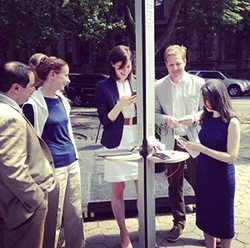
By Jim Innes
With the Association for the Advancement of Sustainability in Higher Education (AASHE) encouraging colleges to incorporate green technology and a growing number of government grants awarded to universities to install solar-power solutions, campuses are looking beyond solar panel installations on buildings.
As consumers become more dependent on laptops and tablets, staying connected to a power sources has become a top priority. Smartphones may be getting smarter, but their batteries are draining faster, and so mobile tech-savvy people are looking for reliable public places to recharge electronic devices. Rather than fight over limited outlets and drive up electric bills, a few innovative companies are finding ways to offer renewable, free solar energy charging stations for community use.
- Social enterprise-based d.light design manufactures and distributes solar lighting and power products targeting the 2.6 billion people globally without access to reliable electricity. d.light’s small-scale, distributed renewable energy solutions designed for households and small businesses are transforming the way people all over the world can access and pay for power.
- StreetCharge public charging stations debuted in New York in partnership with AT&T in 2013 and have been popping up with installations across the country. Solar power systems developer Goal Zero and Brooklyn design studio Pensa joined forces for these stations topped by PV panels that charge up a powerful internal battery. Six phones can be charged at a time, but there is no seating, so practicality and comfort may be an issue.
- CarrierClass Green Infrastructure’s ConnecTable Solar-Charging Stations are fully engineered solar power charging and backup power systems designed to accommodate a range of table design aesthetics, surface materials, and site design objectives. They feature an uncompromising structural integrity with 90mph wind ratings, and multiple tables can be combined to form a micro grid and a backup power source during extended power outages.
- Sol Power LLC builds solar powered charging stations for cell phones. The safe and secure lockers are designed to charge up to 15 cell phones at once. They also offer a customizable outdoor advertising platform. The downside is a limited battery functionality that would likely go down after extended bad weather or heavy charging.
- SOLAQUA’s Sundog Power-To-Go allows consumers to take their power anywhere. Built to be mobile, the power station is built on a cart for easy maneuverability. Take it with you to run your laptop, mobile cooler, cell phones, power lights, and audio systems. Standard 110v 3 prong outlets assure that most common household items can be plugged in, but this device is strictly utilitarian with limited power supply over longer periods.
- Grid2Go Solar Mobile Charger allows consumers the freedom to charge two devices simultaneously without being tied down to outlet availability. Small and powerful, they can charge most smart phones from empty to full three times before it needs to be recharged. They can be recharged from the sun or from a wall or USB outlet and comes with cords and connectors.
These solar charging solutions are being utilized everywhere from off-grid camping facilities to universities, theme parks, sports complexes, corporate parks and public parks. As we become more technology-reliant, the demand for energy is only increasing. But we can not continue to rely on fossil fuels. Solar technology companies continue to pave the way, utilizing a free, clean resource for abundant energy.
Image credit: Street Charge via Instagram
Jim Innes is the CEO of CarrierClass Green Infrastructure, a leader in off-grid solar technology. CCGI designs, sells, and installs solar electric, solar thermal, and custom off-grid solar power products for commercial and residential customers. Learn more at www.ccgigogreen.com.
TriplePundit has published articles from over 1000 contributors. If you'd like to be a guest author, please get in touch!














